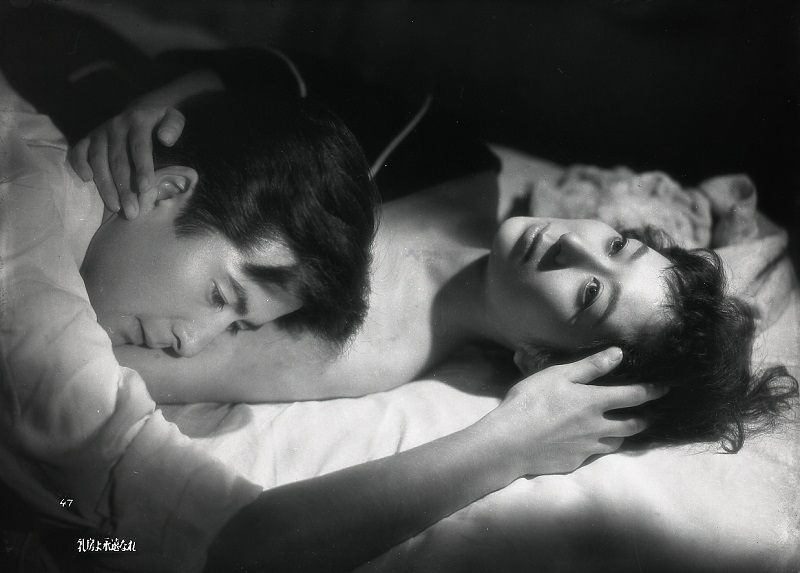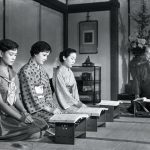The Moon Has Risen and Forever a Woman will be screened during this 21st edition of the Film Festival, two works by the renowned actress and filmmaker from Japan that’ll be introduced by Japanese cinema expert Irene González-López
Ana Mariscal’s The Path will be followed by a talk with David García, the filmmaker’s son, and Virginia Guarinos, an expert on female directors in Spanish cinema
The section rescues from oblivion four other titles directed by Mohammad Reza Aslani, Adolfas Mekas, Helma Sanders-Brahms and Wojciech Jerzy
Las Palmas de Gran Canaria, Tuesday 19 April 2022.- The Las Palmas de Gran Canaria International Film Festival recovers in Déjà Vu two works by one of the most famous faces in Japanese classical cinema, Kinuyo Tanaka. To be precise, during this 21st edition of the Film Festival The Moon Has Risen and Forever a Woman will be screened with a prior introduction by expert on Japanese cinema Irene González-López. In addition to these two titles, the section will include five other films by different authors, among them Ana Mariscal’s The Path. According to its programmer, Gloria Benito, every year Déjà Vu seeks “to draw attention to certain filmographies so they aren’t forgotten.”
With over 200 film works on her resumé after a career that spanned for over half a century and which started when she was only fourteen years old, Kinuyo Tanaka (1909-1975) managed to become one of the best actresses in the history of Japan. Likewise, she was also the first woman in her country to direct feature films that, according to González-López, focus on strong female characters.
Altogether, between 1953 and 1962, the director made six films that include Love Letter (Koibumi, 1953), The Moon Has Risen (Tsuki Wa Noborinu, 1955) and Forever a Woman (Chubusa Yo Eien Nare, 1955). The Festival will “dig out” these last two ones in particular. The former will be screened on Sunday 24 at 5 pm at Cinesa El Muelle Screen 5. In this family drama starring three sisters who live with their father, the actress shows clear influences from the filmmakers she worked with like, for instance, Yasujiro Ozu. The film will be screened, too, on Saturday 30 at noon at Cinesa El Muelle Screen 9.
At the same place and time, a day later, on Monday 25, Forever a Woman (1955, 110 min.) will be screened. It portrays the last years of poet Nakajo Fumiko, who passed away at the age of 32 due to breast cancer. In this work, considered by many to be her best, and which will be screened on Sunday May 1, too, at Cinesa El Muelle Screen 5, Kinuyo Tanaka deals with such a delicate illness from a pioneering point of view. Irene González-López, teacher of Japanese Studies at Birkbeck, London University and associate researcher at Kingston University, will be the one in charge of introducing the screenings of both titles.
In addition to these two works, among the selection of films that make up this 2022 Déjà Vu there are five other titles which, as Gloria Benito points out, are “mostly unknown” to the public. In fact, since some of them have never been released in Spain, their digitally restored versions will be premiering in our country.
The one arriving first on Friday 22 at 6 pm at Cinesa El Muelle Screen 5 will be Germany Pale Mother (1980, 151 min.). In this production, its director Helma Sanders-Brahms narrates with her own voice the experience of her mother during the Third Reich. This work stood as a clear example of feminist cinema for her generation and was nominated to a Golden Bear at the Berlin International Film Festival the year it was released. The film will also be screened at the same place on Sunday 24 at 8 pm.
Hallelujah the Hills (1963, 88 min.), Adolfas Mekas’s crazy comedy, will be another jewel recovered during the Festival. It will be screened on Saturday 23 at 8 pm at Cinesa El Muelle Screen 6 and on Thursday 28 at 10 pm at Cinesa El Muelle Screen 5. After appearing at the critics’ section of the Cannes Festival and at the Montreal Film Festival, this feature film won the Silver Sail at the 1963 Locarno International Film Festival. Later that year it premiered in USA at the first New York Film Festival held at the Lincoln Center.
Another comedy, The Hourglass Sanatorium (1973, 124 min.), directed by Wojciech Jerzy Has and considered one of the most important films in Polish cinema, will introduce the audience to the surrealist adventures of a man who is looking for his father in one of these mental health centers. The film won the Jury Prize at the 1973 Cannes Festival, where it was also nominated to the Palme d’Or. A year later it won the Best Production Design Award at the Polish Film Festival. Now it will be screened twice at the Las Palmas de Gran Canaria International Film Festival. The first screening will take place on Monday 25 at 10 pm at Cinesa El Muelle Screen 7, while the second one, scheduled for Sunday May 1 at 6 pm at Cinesa El Muelle Screen 8, will end the screenings of the Déjà Vu section.
The Path (1964, 91 min.) by Ana Mariscal is another work programmed in this section. The filmmaker, a pioneer in Spain, adapts Delibes’ novel with an Italian-neorealism-like aesthetic. This new restored version has recently appeared at international festivals such as Cannes, where it was included in last year’s Classics section. It now arrives to the Gran-Canarian capital, where it will be screened for the first time on Tuesday 26 at 5 pm at Cinesa El Muelle Screen 11. The screening will be followed by a talk with David García Rodríguez, son of the filmmaker, and Virginia Guarinos, teacher at Seville University and expert on female directors in Spanish cinema. The second screening of the film will take place on Thursday 28 at 8:30 pm at Cinesa El Muelle Screen 7.
The family thriller The Chess Game of the Wind (1976, 93 min.) will be screened too on Tuesday 26, but at 10 pm at Cinesa El Muelle Screen 11. The film was directed by Iranian Mohammad Reza Aslani in 1976 and, after receiving ferocious critics, was only shown twice in its filmmaker’s home country. It was restored in Paris after being found at a junk shop in 2014. Its second screening will take place on Thursday 28 at 6 pm at Cinesa El Muelle Screen 8.
The Las Palmas de Gran Canaria International Film Festival, organized by the Culture area of the Gran-Canarian capital’s City Council through Promoción de la Ciudad de Las Palmas de Gran Canaria, has received public assistance by the ICAA [Institute of Cinematography and Audiovisual Arts] and the program for the internationalization of Spanish culture, PICE Visitantes, of Acción Cultural Española (AC/E).
Among the Festival’s collaborators we may find Cinesa El Muelle, El Muelle Shopping Center, Hotel Cristina by Tigotan, the Elder Museum of Science and Technology or Casa África, places which also function as seats or hold activities; as well as other institutions and companies such as Audiovisuales Canarias, Music Library & SFX or the International Bach Festival. Likewise, its market, MECAS, has been possible thanks to the sponsorship of the Gran Canaria Film Commission-Sociedad de Promoción Económica de Gran Canaria and the support of Canary Islands Film and Proexca.
The University of Las Palmas de Gran Canaria, the Mid Atlantic University, the Audiovisual Cluster of the Canary Islands, CIMA Canarias, the Asociación Microclima Cineastas de Canarias [Association of Filmmakers of the Canary Islands ‘Microclima’] and Repeople are also collaborators of the Festival.
These are the seven titles Déjà Vu will “dig out” in 2022:
Deutschland bleiche mutter/ Germany Pale Mother by Helma Sanders-Brahms (Germany, 1980, 151 min.)
El camino/ The Path by Ana Mariscal (Spain, 1964, 91 min.)
Hallelujah the Hills by Adolfas Mekas (USA, 1963, 88 min.)
Sanatorium Pod Klepsydra/ The Hourglass Snatorium by Wojciech Jerzy Has
(Poland, 1973, 124 min.)
Shathranj- E Baad/ Chess Game of the Wind by Mohammad Reza Aslani (Iran, 1976, 93 min.)
Chubusa Yo Eien Nare/ Forever a Woman aka The Eternal Breasts by Kinuyo Tanaka (Japan, 1955, 110 min.)
Tsuki Wa Noburinu/ The Moon Has Risen by Kinuyo Tanaka (Japan, 1955, 102 min.)
Share this Post




